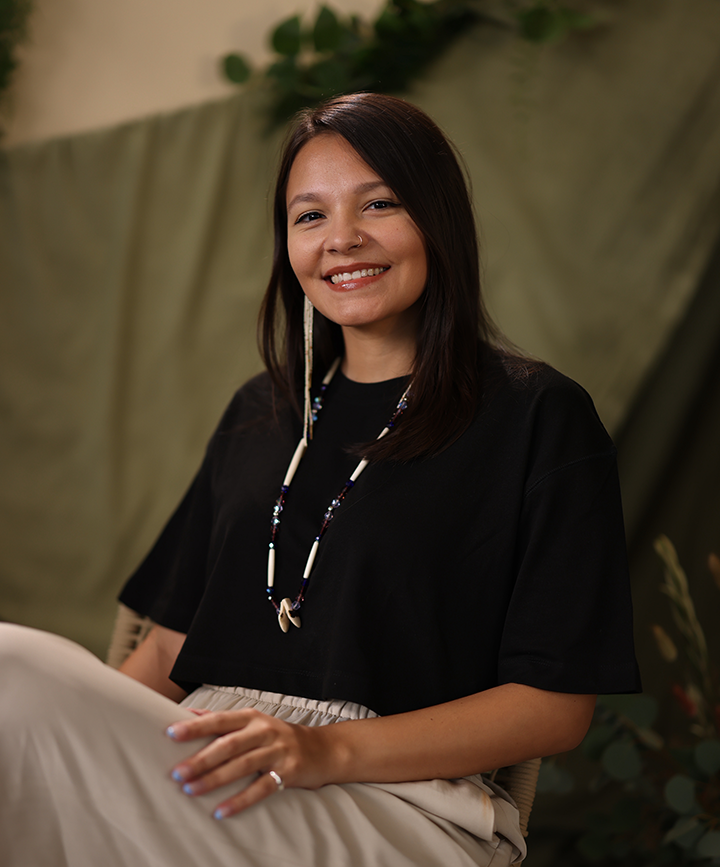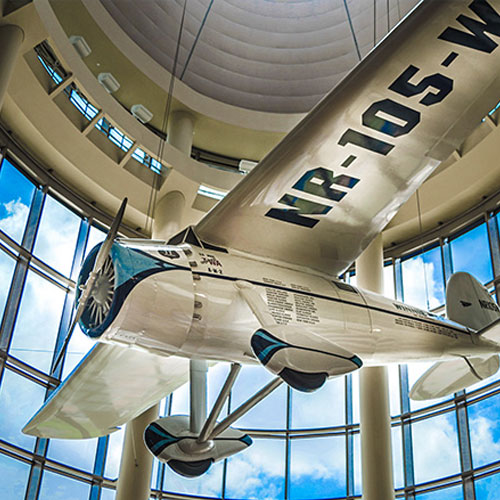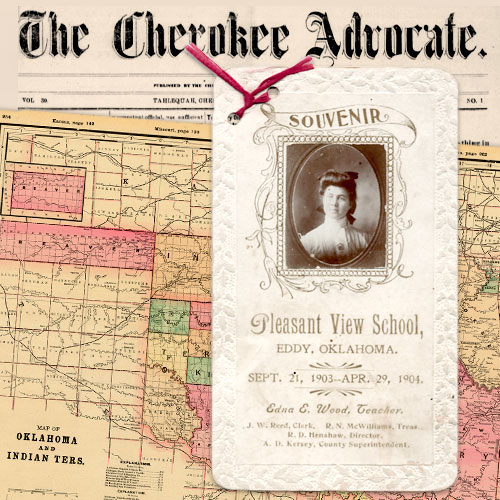
Oklahoma in Context
The Oklahoma History Symposium
May 3, 2025
The 2025 Oklahoma History Symposium was held on Saturday, May 3, 2025, at the Oklahoma History Center in Oklahoma City. Presented by the Oklahoma Historical Society, the symposium is a one-day event encompassing a range of historical topics pertaining to Oklahoma. It provides a venue for scholars, students, educators, public history professionals, and the interested public from across the state and region to share their work and interests with others. The theme was “Oklahoma in Context.”
Any views, findings, conclusions, or recommendations expressed during the program do not necessarily represent those of the Oklahoma Historical Society.
Schedule
| 9:30 a.m– 4 p.m. |
Visit symposium exhibitors |
| 9:30 a.m. | Networking, coffee, and donuts |
| 10 a.m. | Meeting of the OHS Membership This meeting includes the executive director’s report with updates about OHS activities, the announcement of board election results, the swearing-in of new board members, and possible action on items brought before the membership, if any. This meeting is open to the public. |
| 10:15 a.m. | Organizational Meeting of the OHS Board of Directors In this brief meeting, the OHS Board of Directors elects officers, and the president may appoint committee members. This meeting is open to the public. | 10:45– 11:30 a.m. | Book Signing Betty Blanks, Pick Up Your Name and Write: The Life of Wilma Elizabeth McDaniel (2024) Joshua Clough, Resisting Oklahoma’s Reign of Terror: The Society of Oklahoma Indians and the Fight for Native Rights, 1923–1928 (2024) Susan Dragoo, Finding the Butterfield: A Journey Through Time in Indian Territory (2024) Bill Price, subject of At War with Corruption: A Biography of Bill Price, U.S. Attorney for the Western District of Oklahoma (2021) |
11 a.m.– 12:30 p.m. | Lunch Boxed lunches may be pre-ordered at the time of registration or attendees are welcome to bring lunch with them. |
| 11:30 a.m.–12:30 p.m. |
 Keynote KeynoteAward-winning filmmaker Loren Waters (Cherokee/Kiowa) will be our keynote speaker. Waters will share about her short documentary Meet Me at the Creek, which focuses on Rebecca Jim’s (Cherokee) efforts to restore Tar Creek in Miami, Oklahoma. Waters’s experience in the film industry includes directing, producing, and casting for film and television including Reservation Dogs, Fancy Dance, and Killers of the Flower Moon. Note: the keynote session was not recorded. 
This program is funded in part by Oklahoma Humanities (OH) and the National Endowment for the Humanities (NEH). Any views, findings, conclusions, or recommendations expressed in the program do not necessarily represent those of OH or NEH. |
| 12:30–12:45 p.m. | Break |
| 12:45–1:30 p.m. |
“Raising Washington: Preserving the Legacy of African American History in Stillwater” This discussion session includes team members who have worked together to save the historic Booker T. Washington School in Stillwater. The school building was recently returned to city ownership after being abandoned for more than two decades and enduring years of persistent flooding. The all-volunteer efforts to save the historic structure have engaged a broad spectrum of community support, from Oklahoma State University faculty and City of Stillwater employees to Washington School alums and concerned residents. Washington School is the only standing example of an All-Black segregated school in Payne County. “A Story on Two Wheels: Bikers in Ledger Art on the Borderlands of Experience” This session will explore the use of motorcycles, bikers, and biker art in the modern generation of ledger art. James Bland asserts that since the 1970s, Native culture and biker culture have shared experiences and symbols that result in a common language. This is especially pertinent to Oklahoma, as the Southern Plains was the birthplace of many ledger artists. |
| 1:30–1:45 p.m. | Break |
| 1:45–2:45 p.m. |
“‘The Magnificent Citizenship’: Politics, Gender, and Race in Early Oklahoma” This session examines politics, gender, race, and the contested nature of citizenship in Oklahoma as it transitioned from territory to state. Christine Carlson’s project asks how maternalism, alliances with conservative groups, and racial questions drove and stymied the Oklahoma women’s suffrage movement from 1895 to 1907. Thayme Watson’s piece on the Oklahoma Statehood Convention examines how delegates tied notions of gender and race to citizenship and who would be an “Oklahoman.” Hope Cunningham analyzes the relationships between masculinity, patriotism, and vigilantism in the statewide response to the 1917 Green Corn Rebellion. This illuminates the unique political atmosphere during World War I, and how Oklahomans viewed the proper expression of manhood. “150th Anniversary of the ‘Sand Hill Fight’ on the Cheyenne and Arapaho Reservation” On April 6, 1875, US army soldiers used deadly force against Cheyenne men, women, and children during the traumatic “Sand Hill Fight” near Darlington, Indian Territory. Following the event, deadly force was again used against the Cheyenne in the Sappa Creek Battle in Kansas. The “Sand Hill Fight” represented a unique confluence of Plains Indian combatants, non-combatants, US reservation officials, white survivors of Native captivity, and US soldiers. This presentation is a critical examination of two conflicting accounts of this forgotten historic event. |
| 2:45–3 p.m. | Break |
| 3–3:45 p.m. |
“OSU’s Response to 9/11—A Reflection Through Oral History, University Newspapers, and the Institutional Change” The events of 9/11 had far-reaching impacts on campuses across the US, including Oklahoma State University (OSU). At OSU, the aftermath spurred debates on religious freedom, terrorism, and national security, igniting reflective discussions and, in some cases, reactionary sentiments. Our panel explores OSU’s response by drawing on interdisciplinary theories, archived newspapers, and oral histories, aiming to provide insight into how students, faculty, and the university administration navigated the complex period after 9/11. This panel’s goal is to use the past to understand the present, build a historical record of OSU’s response, and illuminate patterns of institutional response, activism, and resilience here in Oklahoma. “The Reconstruction Era National Historic Network and How it Connects to the History of Oklahoma” Due to National Park Service funding and travel restrictions, this session has been canceled. We apologize for any inconvenience. |
| 3:45–4 p.m. | Break |
| 4–4:45 p.m. |
“Making It Home: An Overview of Oklahoma Native American Baseball Players in Major League Baseball” From 1999 to 2024, the Baseball Almanac website has compiled a list of Native Americans who played in the Major Leagues. The list appears comprehensive, identifying 54 players who played professional ball from 1897 to 2020. However, close examination reveals the list is flawed. This presentation recounts the work of our speakers to rectify these mistakes. Fuller, Kahle, and Daugherty have expunged the list of errors while identifying previously unrecognized Native players, paying particular attention to the stories and accomplishments of ball players from Oklahoma. From the World Series heroics of Allie Reynolds (Muscogee) to the lesser-known baserunning feats of Paddy Mayes (Muscogee), Oklahoma Native baseball players have been a part of every era of the Great American Indian Pastime. Their achievements shed light on a side of American sports history that has yet to receive the attention it deserves. “Bringing Bath Ave Back: Virtual Reality Modeling for Lost Historic Spaces” In 2021, librarians Judie Matthews and Bobby Reed began to develop a first-of-its-kind virtual reality model of 700 N. Bath Avenue, an Oklahoma City block lost to Urban Renewal. Using hundreds of primary sources, the team created a lifelike and enveloping version of an area of town that hadn’t existed for 40 years. Using maps, photos, newspaper reports and advertisements, and oral histories, Matthews and Reed have created a new tool for educators and historians: virtual reality models that can place a student in the middle of history. This session will showcase the VR model and walk attendees through the steps to create the model, the hurdles in production, potential next steps, and future endeavors. |
Contact Us
Explore Past Events
2024 Oklahoma History Symposium
2023 Oklahoma History Symposium
2022 Oklahoma History Symposium
2021 Oklahoma History Conference (virtual)





